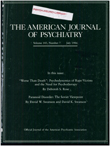Six-year follow-up of patients with carefully diagnosed good- and poor- prognosis schizophrenia
Abstract
Forty-nine probands, diagnosed according to objective diagnostic criteria as having good- or poor-prognosis schizophrenia, were interviewed 6 years after being diagnosed to assess outcome measured by the Strauss-Carpenter outcome scale, global ratings made by experienced clinicians, and Feighner criteria. The majority of poor-prognosis probands were doing poorly, had a higher than expected number of suicides or probable suicides, and had evidence of organic impairment. The authors conclude that poor prognosis can be accurately predicted when longitudinal factors are embedded in the diagnostic criteria and that clinicians should be aware of the substantial risk of suicide and organic impairment with schizophrenia.
Access content
To read the fulltext, please use one of the options below to sign in or purchase access.- Personal login
- Institutional Login
- Sign in via OpenAthens
- Register for access
-
Please login/register if you wish to pair your device and check access availability.
Not a subscriber?
PsychiatryOnline subscription options offer access to the DSM-5 library, books, journals, CME, and patient resources. This all-in-one virtual library provides psychiatrists and mental health professionals with key resources for diagnosis, treatment, research, and professional development.
Need more help? PsychiatryOnline Customer Service may be reached by emailing [email protected] or by calling 800-368-5777 (in the U.S.) or 703-907-7322 (outside the U.S.).



